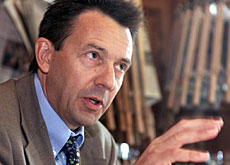Pro-Tibet rallies held in Switzerland

Protests took place across Switzerland on Wednesday to mark the 45th anniversary of an anti-Chinese uprising in Tibet.
Around 300 demonstrators gathered outside the Chinese embassy in the capital, Bern, while other rallies were held in about 20 cities and towns.
Campaigners called for the Chinese government to start a serious dialogue with the 14th Dalai Lama, who fled into exile in India following the uprising.
Since March 10, 1959, many other Tibetans have followed their spiritual leader by fleeing to India, the United States, or Switzerland.
In Basel, Geneva and many other Swiss towns Tibetan flags were flown in support of Tibet’s political rights.
Campaign organisers said the Chinese occupation had given rise to a “brutal policy of intimidation, cultural repression and socioeconomic marginalisation” of Tibet.
Refugees
Today, the 3,000 members of the Tibetan community in Switzerland make it the largest in Europe, and the third largest in the world, after those in India and the US.
“Most of us came here more than 40 years ago,” Jampa Tsering, who chairs the Swiss Tibetan community, told swissinfo.
“In the early 1960s, the Red Cross helped many displaced Tibetans to get out of the reception camps in India, and obtain refugee status in Switzerland.”
“I arrived in 1998, also from India, where my parents had fled during the disturbances in 1959,” Jampa continued. “I got married in Switzerland and now I work in a factory.”
Jampa is one of about 300 Tibetans who have settled in the small Zurich district of Rikon (1,500 residents).
“Of course, there are a lot of them. But there haven’t been any particular problems with integration,” noted local official Andreas Meyer. “They’re courteous and keep themselves to themselves.”
“Many [Tibetans] have acquired Swiss citizenship,” said Jampa. But links with Tibetan culture and traditions are still strong, especially among the elderly.
“Our community sponsors seven Tibetan schools around Switzerland, publishes a magazine and organises traditional celebrations,” he added.
Eight monks of Rikon
A short distance away, on the hill overlooking the village, is a Tibetan monastery. “It’s a very important place for us. I often go there to pray,” Jampa said.
The monastery was founded almost 40 years ago, with support from the Dalai Lama himself, to provide support for the growing Tibetan community in Switzerland.
Inside the block live eight Buddhist monks who teach meditation and Tibetan language, in addition to carrying out their religious duties.
“I’ve lived here since 1969,” said elderly monk Tokhang Khedup.
“We have anything from ten to 30 visitors a week. Most are Tibetans, but there are also Swiss who are interested in our history, religion or culture.”
swissinfo
It is estimated that more than 150,000 Tibetans have fled abroad since 1959.
Switzerland hosts the third-largest Tibetan community in the world, after India and the US.
Tibet is on a plateau 4,000 to 6,000 metres above sea level, bordered by India, Myanmar and China.
Tibet has a surface area of 1,200,000 square kilometres(Switzerland: 41,000 square kilometres) and about 2.5 million inhabitants.
In 1903, Tibet was occupied by British troops. In 1950, the country was invaded (or liberated, according to the Chinese) by the troops of Mao Tse-tung, who had just re-unified China.
In 1959, the first major popular rebellion against the Chinese took place. It ended with the exile of the 14th Dalai Lama.
The spiritual leader set up a Tibetan government in exile in India and has demanded Tibet’s independence from China.
The Swiss government view is that there is only one China – the People’s Republic of China – and that Tibet is part of China.

In compliance with the JTI standards
More: SWI swissinfo.ch certified by the Journalism Trust Initiative









You can find an overview of ongoing debates with our journalists here . Please join us!
If you want to start a conversation about a topic raised in this article or want to report factual errors, email us at english@swissinfo.ch.